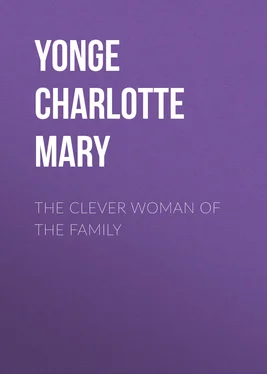Charlotte Yonge - The Clever Woman of the Family
Здесь есть возможность читать онлайн «Charlotte Yonge - The Clever Woman of the Family» — ознакомительный отрывок электронной книги совершенно бесплатно, а после прочтения отрывка купить полную версию. В некоторых случаях можно слушать аудио, скачать через торрент в формате fb2 и присутствует краткое содержание. Жанр: foreign_prose, literature_19, Европейская старинная литература, foreign_antique, на английском языке. Описание произведения, (предисловие) а так же отзывы посетителей доступны на портале библиотеки ЛибКат.
- Название:The Clever Woman of the Family
- Автор:
- Жанр:
- Год:неизвестен
- ISBN:нет данных
- Рейтинг книги:4 / 5. Голосов: 1
-
Избранное:Добавить в избранное
- Отзывы:
-
Ваша оценка:
- 80
- 1
- 2
- 3
- 4
- 5
The Clever Woman of the Family: краткое содержание, описание и аннотация
Предлагаем к чтению аннотацию, описание, краткое содержание или предисловие (зависит от того, что написал сам автор книги «The Clever Woman of the Family»). Если вы не нашли необходимую информацию о книге — напишите в комментариях, мы постараемся отыскать её.
The Clever Woman of the Family — читать онлайн ознакомительный отрывок
Ниже представлен текст книги, разбитый по страницам. Система сохранения места последней прочитанной страницы, позволяет с удобством читать онлайн бесплатно книгу «The Clever Woman of the Family», без необходимости каждый раз заново искать на чём Вы остановились. Поставьте закладку, и сможете в любой момент перейти на страницу, на которой закончили чтение.
Интервал:
Закладка:
“I was not afraid for her,” said Colonel Keith, smiling, “but of her being rather too much for you.”
“Rachel is not too much for me,” said Fanny, “and she and Grace will entertain Bessie, and take her out. But I will talk to Alick. He spoke of coming to-morrow. And don’t you think I might ask Colonel and Mrs. Hammond to spend a day? They would so like the sea for the children.”
“Certainly.”
“Then perhaps you would write—oh, I forgot,” colouring up, “I never can forget the old days, it seems as if you were on the staff still.”
“I always am on yours, and always hope to be,” he said, smiling, “though I am afraid I can’t write your note to the Hammonds for you.”
“But you won’t go away,” she said. “I know your time will be taken up, and you must not let me or the boys be troublesome; but to have you here makes me so much less lost and lonely. And I shall have such a friend in your Erminia. Is that her name?”
“Ermine, an old Welsh name, the softest I ever heard. Indeed it is dressing time,” added Colonel Keith, and both moved away with the startled precision of members of a punctual military household, still feeling themselves accountable to somebody.
CHAPTER VI. ERMINE’S RESOLUTION
“For as his hand the weather steers,
So thrive I best ‘twixt joys and tears,
And all the year have some green ears.”—
Alison had not been wrong in her presentiment that the second interview would be more trying than the first. The exceeding brightness and animation of Ermine’s countenance, her speaking eyes, unchanged complexion, and lively manner—above all, the restoration of her real substantial self—had so sufficed and engrossed Colin Keith in the gladness of their first meeting that he had failed to comprehend her helpless state; and already knowing her to be an invalid, not entirely recovered from her accident, he was only agreeably surprised to see the beauty of face he had loved so long, retaining all its vivacity of expression. And when he met Alison the next morning with a cordial brotherly greeting and inquiry for her sister, her “Very well,” and “not at all the worse for the excitement,” were so hearty and ready that he could not have guessed that “well” with Ermine meant something rather relative than positive. Alison brought him a playful message from her, that since he was not going to Belfast, she should meet him with a freer conscience if he would first give her time for Rose’s lessons, and, as he said, he had lived long enough with Messrs. Conrade and Co. to acknowledge the wisdom of the message. But Rose had not long been at leisure to look out for him before he made his appearance, and walked in by right, as one at home; and sitting down in his yesterday’s place, took the little maiden on his knee, and began to talk to her about the lessons he had been told to wait for. What would she have done without them? He knew some people who never could leave the house quiet enough to hear one’s-self speak if they were deprived of lessons. Was that the way with her? Rose laughed like a creature, her aunt said, “to whom the notion of noise at play was something strange and ridiculous; necessity has reduced her to Jacqueline Pascal’s system with her pensionnaires, who were allowed to play one by one without any noise.”
“But I don’t play all alone,” said Rose; “I play with you, Aunt Ermine, and with Violetta.”
And Violetta speedily had the honour of an introduction, very solemnly gone through, in due form; Ermine, in the languid sportiveness of enjoyment of his presence and his kindness to the child, inciting Rose to present Miss Violetta Williams to Colonel Keith, an introduction that he returned with a grand military salute, at the same time as he shook the doll’s inseparable fingers. “Well, Miss Violetta, and Miss Rose, when you come to live with me, I shall hope for the pleasure of teaching you to make a noise.”
“What does he mean?” said Rose, turning round amazed upon her aunt.
“I am afraid he does not quite know,” said Ermine, sadly.
“Nay, Ermine,” said he, turning from the child, and bending over her, “you are the last who should say that. Have I not told you that there is nothing now in our way—no one with a right to object, and means enough for all we should wish, including her—? What is the matter?” he added, startled by her look.
“Ah, Colin! I thought you knew—”
“Knew what, Ermine?” with his brows drawn together.
“Knew—what I am,” she said; “knew the impossibility. What, they have not told you? I thought I was the invalid, the cripple, with every one.”
“I knew you had suffered cruelly; I knew you were lame,” he said, breathlessly; “but—what—”
“It is more than lame,” she said. “I should be better off if the fiction of the Queens of Spain were truth with me. I could not move from this chair without help. Oh, Colin! poor Colin! it was very cruel not to have prepared you for this!” she added, as he gazed at her in grief and dismay, and made a vain attempt to find the voice that would not come. “Yes, indeed it is so,” she said; “the explosion, rather than the fire, did mischief below the knee that poor nature could not repair, and I can but just stand, and cannot walk at all.”
“Has anything been done—advice?” he murmured.
“Advice upon advice, so that I felt at the last almost a compensation to be out of the way of the doctors. No, nothing more can be done; and now that one is used to it, the snail is very comfortable in its shell. But I wish you could have known it sooner!” she added, seeing him shade his brow with his hand, overwhelmed.
“What you must have suffered!” he murmured.
“That is all over long ago; every year has left that further behind, and made me more content. Dear Colin, for me there is nothing to grieve.”
He could not control himself, rose up, made a long stride, and passed through the open window into the garden.
“Oh, if I could only follow him,” gasped Ermine, joining her hands and looking up.
“Is it because you can’t walk?” said Rose, somewhat frightened, and for the first time beginning to comprehend that her joyous-tempered aunt could be a subject for pity.
“Oh! this was what I feared!” sighed Ermine. “Oh, give us strength to go through with it.” Then becoming awake to the child’s presence—“A little water, if you please, my dear.” Then, more composedly, “Don’t be frightened, my Rose; you did not know it was such a shock to find me so laid by—”
“He is in the garden walking up and down,” said Rose. “May I go and tell him how much merrier you always are than Aunt Ailie?”
Poor Ermine felt anything but merry just then, but she had some experience of Rose’s powers of soothing, and signed assent. So in another second Colonel Keith was met in the hasty, agonized walk by which he was endeavouring to work off his agitation, and the slender child looked wistfully up at him from dark depths of half understanding eyes—“Please, please don’t be so very sorry,” she said. “Aunt Ermine does not like it. She never is sorry for herself—”
“Have I shaken her—distressed her?” he asked, anxiously.
“She doesn’t like you to be sorry,” said Rose, looking up. “And, indeed, she does not mind it; she is such a merry aunt! Please, come in again, and see how happy we always are—”
The last words were spoken so near the window that Ermine caught them, and said, “Yes, come in, Colin, and learn not to grieve for me, or you will make me repent of my selfish gladness yesterday.”
“Not grieve!” he exclaimed, “when I think of the beautiful vigorous being that used to be the life of the place—” and he would have said more but for a deprecating sign of the hand.
Читать дальшеИнтервал:
Закладка:
Похожие книги на «The Clever Woman of the Family»
Представляем Вашему вниманию похожие книги на «The Clever Woman of the Family» списком для выбора. Мы отобрали схожую по названию и смыслу литературу в надежде предоставить читателям больше вариантов отыскать новые, интересные, ещё непрочитанные произведения.
Обсуждение, отзывы о книге «The Clever Woman of the Family» и просто собственные мнения читателей. Оставьте ваши комментарии, напишите, что Вы думаете о произведении, его смысле или главных героях. Укажите что конкретно понравилось, а что нет, и почему Вы так считаете.












